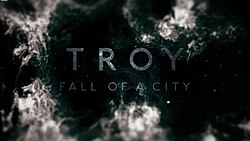Critical reception
On review aggregator website Rotten Tomatoes, the series holds a critics' approval rating of 68% based on 25 critic reviews, and an average rating of 6/10. [15] The critics' consensus reads: "Troy: Fall of a City never tries to reinvent the bronze wheel, but succeeds in engaging audiences with both royal and divine intrigue, making for a highly enjoyable romp in the lost kingdom." [15]
In a 16 February 2018 review for The Independent , Jacob Stolworthy praised the series for its willingness to alter the myths, [16] as well as Louis Hunter's acting in his lead role as Paris. [16] He also praised the show's elaborate costuming, "its lavish set design, production values and sci-fi soundtrack", [16] commenting, "Viewers are immediately transported to ancient locations (in actuality beautiful Cape Town) in scene one and never relents. If it's escapism you're wanting, series link away." [16] He criticized the first episode; however, for seeming "too tame" in light of the numerous early comparisons to HBO's Game of Thrones . [16]
In an 18 February review for The Guardian , Euan Ferguson praised the show for its faithfulness to the original myths [17] and for its strong portrayal of Helen, which he stated stood in stark contrast to the demure portrayal of the character by Diane Kruger in the 2004 Hollywood blockbuster film Troy , which had starred Brad Pitt as Achilles. [17] Ferguson compared Troy: Fall of a City favourably to Game of Thrones and commented that the show will "hopefully expunge any residual memories of the 2004 Brad Pitt epic". [17] He comments, "...older viewers can marvel at the silked lushness of the sea scenes while revelling in an old tale well told, younger ones can learn a little, about the names of the gods, and the fire-haunted dreams of Cassandra, and about mankind’s ancient rush towards betrayal." [17]
A review from the same day by Rupert Hawksley for The Daily Telegraph tentatively praised Troy: Fall of a City for its more thoughtful, psychologically complicated interpretation of the Trojan War in sharp contrast to the 2004 film Troy, which Hawksley derided as a "shallow flex-fest". [18] Nonetheless, Hawksley criticized the characters' occasionally stilted dialogue. [18] He concluded, "Troy: Fall of a City might just be a fresh, psychologically knotty take on one of the greatest tales of them all." [18] Also on the same day, Camilla Long, reviewing for The Sunday Times , panned the show, writing, "Troy: Fall of a City, a reworking of the oldest drive-by in history, is so far removed from anything Sophocles might recognize, they should have named it The Real Housewives of Ilium." [19]
In a 24 February review for The Spectator , James Walton dismissed the script as "pitched somewhere between a particularly corny Hollywood epic and a play by Ernie Wise", [20] while the dialogue was pronounced "staggeringly creaky and endlessly bathetic". [20] Walton goes on: "'How did you two get together?'. Paris asked Helen and Menelaus at the banquet given in his honour. ... Impressively, the dialogue even managed to descend into cliché when nobody was actually using any words — as in the scene where the two defeated goddesses from the beauty contest went for one of those anguished bellows that causes all the nearby birds to fly theatrically from the trees." [20]
A review from 28 February by Rachel Cooke for New Statesman panned the show, [21] complaining that "all the men look as if they're in a Calvin Klein ad", that the dialogue is unrealistic, and that its portrayal of Helen and Paris's relationship is "tediously 21st century". [21] Cooke concludes: "The dialogue is so richly silted with self-help banalities, we might as well be watching a Meghan and Harry biopic as a drama inspired by the greatest of all epic poems. There's also something exceedingly creepy about its retro, soft-porny direction (by Owen Harris); every time Helen takes a shower, you half expect her to whip out a Flake." [21]
In an 8 April review for IndieWire , Steve Greene criticized the show for telling the same story that has been told thousands of times before and offering very little innovation. [22] He concludes: "The result is a series more competent than compelling. The tiny diversions from the norm seem thrilling by comparison." [22] He offered extended praise for Gyasi's performance as Achilles and Mawle's performance as Odysseus, [22] and for the show's creators' unusual decision to include the gods in the show. [22]
In an unreservedly positive review for Buffalo News on 26 May 2018, Randy Schiff praised the show for its pace and acting, [23] commenting specifically on Hunter, Dayne, Gyasi, Mawle, O'Connor, and Threlfall's performances. [23] He also lauded the portrayal of Helen as a "stately and intelligent" woman whose "deep desire for independence" is only satisfied once she goes to Troy, where women are valued just as much as men. [23] He also expressed wonderment at the show's portrayal of the Greek deities, [23] writing, "I found myself especially mesmerized by the show's eerie presentation of deities: here, spectacularly partisan goddesses strut across raging battlefields, while a world-weary Zeus (Hakeem Kae-Kazim) remains resolutely neutral amidst the chaos." [23]
Andrea Tallarita defended the show in a 28 June 2018 review for PopMatters , arguing that the show's commercial failure may have been partially a result of the viewing audience's ignorance of the original classical texts, which the show treated with surprising fidelity. [11] Tallarita generally praised the show, stating that it has "a dignified life of [its] own", [11] but criticized the decision to make the gods less involved for the second half of the series, as well as the fact that the show limited itself to only include a small number of especially important deities rather than the vast pantheon appearing in the Iliad, calling this decision "such a wasted opportunity". [11]
